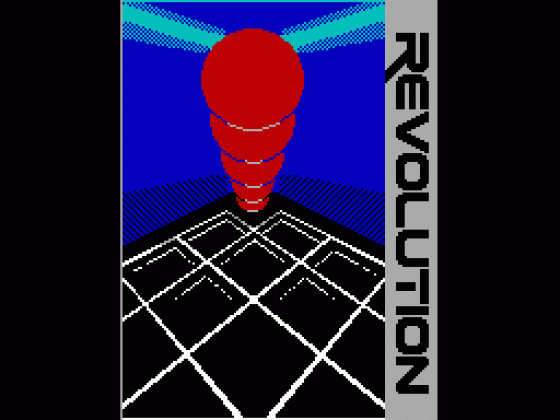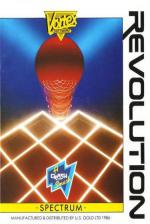
ZX Computing
 1st November 1986
1st November 1986
Revolution
Masterly graphics, infuriating puzzles - all you ever wanted from a bouncing ball game
Costa Panayi, author of many of Vortex Software's previous hits, has made a change in direction after his recent games Alien Encounter and come up with another winner.
Revolution is one of those games which is quite simple to play (in principle anyway) but very difficult to master and absolutely infuriating when you get into the later levels of the game where you can see what you want to do but can't qute pull it off in time.

The game is played on a multi-tiered structure consisting of eight levels, and your task is to start on the bottom level and work your way to the very top. Each level is made up of an assortment of platforms, all on the same level but separated by gaps which have to be avoided. These platforms are arranged in a roughly square arrangement (which changes in each game) with the occasional empty position which you might find yourself plummetting into if you look before you leap (each of these levels is a bit like one of those sliding square puzzles in which you can move the squares around to try and form a picture or sequence of numbers).
You control a ball which can be bounced around the platforms and in order to complete a level and progress to the next you have to solve four puzzles. Scattered around each level you will find four platforms which carry various brick-like structures and shaded pathways. On each of these platforms there are two grey blocks which turn white when you bounce into them and deactivate them. Each brick will remain deactivated for just a few seconds before reactivating and turning grey again, but if you can get both bricks deactivated at the same time then they will both vanish - problem solved and you can move on to the next problem on that level.
Unfortunately you've also got to contend with the shaded pathways on these platforms, and these can have different effects varying from just killing your bouncing or grabbing the ball and shooting it over the edge of the platform into oblivion.
At the start of each level you are shown your position within the overall structure, as well as a map of the particular level that you are on. This map highlights both your own starting position and the position of the puzzles on that level so you've got a few tips to start with. When you see this map it's also a good idea to make a mental note of the empty positions, as I found that I often went bouncing from one screen to the next only to find myself bouncing into nowhere. You only get five lives (though there are additional one for completing levels) so you can't afford to do that too often.
Controlling the ball is an art all in itself. It can move in any direction that a joystick handle can moe in (a joystick is almost compulsory for this game I should think) and responds very smoothly to joystick control, but judging the height and distance of of your bouncing is a skill that will take a lot of refining, especially on some of the trickier puzzles where you've got to squeeze the ball through some quite tight spots.
There are four different heights of bounce, controlled by using the fire button, or you can kill the bounce altogether and just roll along the surface of the platforms. There is also a variety of flying objects which patrol each level and, though few of these are deadly, you can find yourself accidentally colliding with one and bouncing off in a totally unexpected direction.
The graphics are mostly in just two colours to avoid attribute clashes but as with Vortex's Highway games the graphics style is quite distinctive, making good use of fine shading effects to create clear and detailed pictures. But where I found the Highway games to be a bit too fast and furious for my gin-addled reflexes, Revolution is the sort of game that each player can play at his or her own pace. If you want to go bouncing around the platforms like a loony you're quite free to do so, but if you're content to take things a little bit slower and just roll slowly around while you try and figure out which way is up you can do that too.
At £9.99 Revolution is a bit pricey, but it's more likely to provide a long term challenge than most other arcade games around at the moment.
A Monster Hit.



